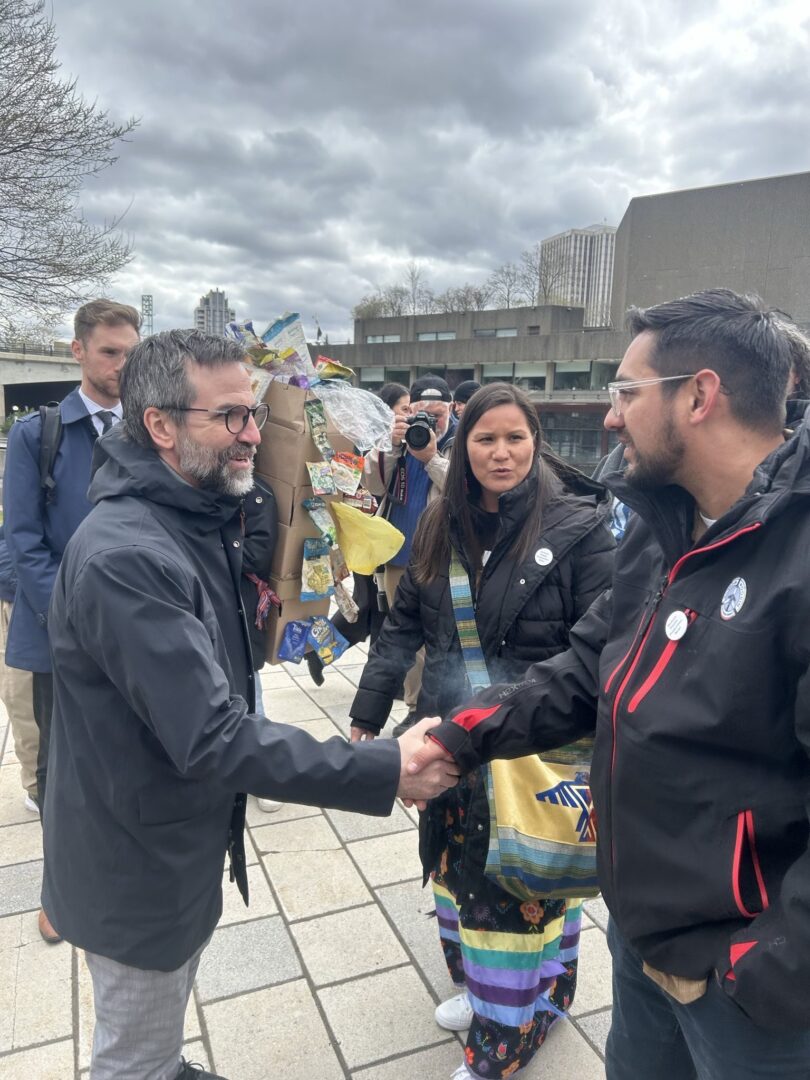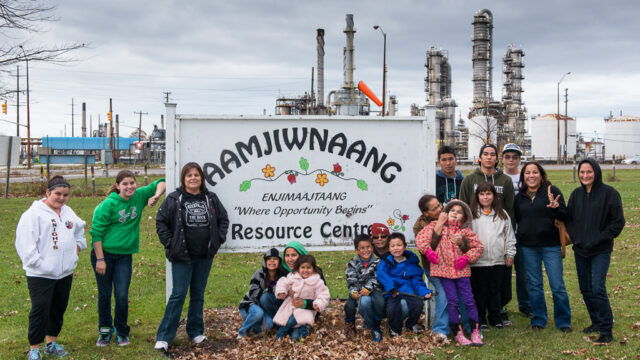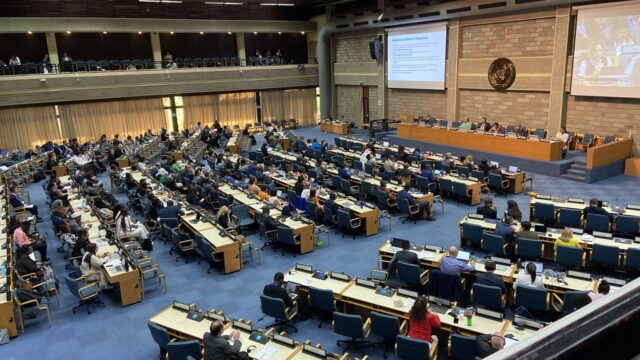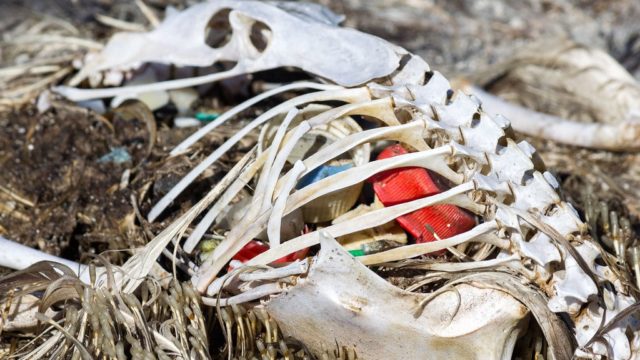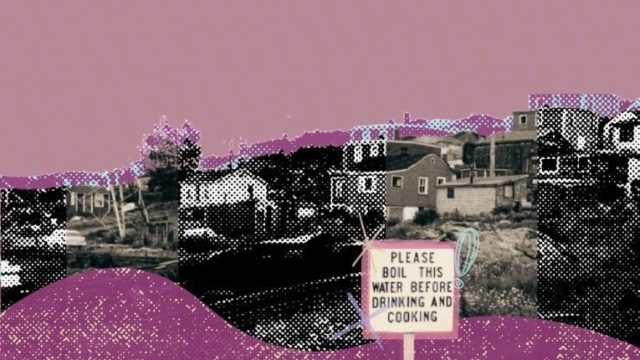OTTAWA/TRADITIONAL, UNCEDED TERRITORY OF THE ALGONQUIN ANISHNAABEG PEOPLE – Today, spokespeople from Aamjiwnaang First Nations, the Society of First Nations, and Keepers of the Water will be participating in a press conference highlighting the disproportionate impacts of plastics pollution on frontline Indigenous communities across Turtle Island. The event is being hosted by Ecojustice as part of the fourth session of the Intergovernmental Negotiating Committee (INC-4) global plastics treaty talks in Ottawa.
Plastic pollution is not just an end-of-life litter problem. Every stage of the plastics lifecycle, from extraction to production, through to disposal, emits greenhouse gases and causes harm to our environment and our health. These harms are borne disproportionately by Indigenous, Black, and other fence line communities who often live near industries associated with different stages of plastic production.
Last week, as delegates prepared for the plastics treaty negotiations, Aamjiwnaang First Nation Chief and Council issued an alert to the community warning of high levels of benzene, a chemical used in the production of plastics that is known to cause cancer and increase respiratory illnesses. Concerningly, industry and the Ontario Ministry of the Environment, Conservation and Parks failed to inform the community about the elevated pollution levels through the public warning system.
With 40 per cent of the country’s petrochemical refineries located there, dangerously high air pollution levels are not an isolated event for the community, they are regular occurrences. This highlights a systemic issue of environmental racism and the urgency of what is at stake in these negotiations for Aamjiwnaang and other frontline communities.
It is crucial the plastics treaty process centres the voices and concerns of Indigenous Peoples and those that have been disproportionately impacted by plastics. Corporate lobbyists should not have more of a say than Indigenous Peoples and frontline communities who have borne the brunt of the impacts of plastic pollution.
Solving the plastic pollution crisis will require collective, collaborative action that centers social and ecological justice in all decision making. Across Turtle Island and around the world, Indigenous communities are leading efforts to pressure governments to urgently regulate plastic production, usage, and disposal. There are more than 600 First Nations communities across so-called Canada whose voices and concerns the Canadian government must listen to and centre in these negotiations.
Janelle Nahmabin, Elected Councillor, Aamjiwnaang First Nation said:
“Aamjiwnaang First Nation wants to work collaboratively with state governments to create a healthier tomorrow for generations to come. The Anishinabe way of thinking is to consider seven generations ahead, and that is why we are here at INC-4 — to be part of the solution to the plastics problem.
“Indigenous Peoples must be active participants in the design and implementation of the plastics treaty. We — like everyone — have the right to a healthy environment and the results of these negotiations should include the duty to prevent exposure to hazardous substances. We have been here before industry and before Canada. This is our home that Canada is giving voice to on our behalf. Gaawiin.”
CJ Smith-White, Elected Councillor, Aamjiwnaang First Nation said:
“Just last week, elevated benzene levels in the air from the INEOS Styrolution facility caused several members of our community to fall ill. This is not acceptable, nor is it an isolated event. Our people, the original people here, the Anishinabe, have been exposed to environmental racism for more than 100 years. Our community and our lands have become a sacrifice zone for the benefit of industry.
“Successive governments have failed to take action to address the impact of this pollution on Aamjiwnaang, and that inaction has had real consequences on lives. Pollution has put our way of life — based off the land — under serious threat. This is environmental racism. The pollution has impacted on our traditional practices, including the medicines that we harvest.”
“Canada has adopted the United Nations Declaration on the Rights of Indigenous Peoples (UNDRIP). It must follow through on its promise at INC-4. It must listen to and centre the voices of Indigenous and frontline communities to secure a legally binding treaty that protects Indigenous rights, human rights, human health, and the environment from the harms of plastic pollution.”
Suzanne Smoke, Outreach Co-ordinator, Society of Native Nations said:
“Treaty negotiations must ensure Indigenous Peoples rights are centered and our expertise and Traditional Ecological Knowledge are embedded within the global plastics treaty. We need to stop the practices of normalizing harm to most impacted peoples and communities where the real solutions exist and where the real solutions come from. We are our own knowledge keepers and experts in living in harmony with our environment.
“As Indigenous Peoples, we want to make it clear that Nature Based Solutions IS Indigenous Knowledge and must be protected and embedded into the framework and language of this treaty.”
Tori Cress, Communications Manager, Keepers of the Water, said:
“Microplastics pollute our water systems globally and are in our bodies right now. What happens to the water happens to people. Despite the negotiated changes made in this plastics pollution treaty this week, microplastics will be in the bodies of our children, grandchildren, and great-grandchildren. In real-time, we are witness to the full circle of fossil fuel plastic. Indigenous bodies, polluted by the toxicity of tar sands extraction and processing, are now polluted with microplastics, a byproduct of the tar sands industry.”
Melissa Gorrie, law reform manager, Ecojustice said:
“At all stages of its lifecycle, plastic is a ubiquitous pollutant that threatens human health and the environment. These harms disproportionately impact the daily lives of the people of Aamjiwnaang and Indigenous communities worldwide. It’s a grave injustice that demands policy and legal changes, including a robust plastics treaty, to address it.”
“It is critical that all efforts to confront the plastic pollution crisis center environmental justice and include frontline communities as equal partners in decision making.”
We invite you to attend and cover this event. Full information below:
Press Conference – Wednesday, April 24, 10 AM ET
Who is speaking: Spokespeople from Aamjiwnaang First Nations, the Society of First Nations, and Keepers of the Water to give remarks. Full media availability for questions to follow.
Where: INC-4 Negotiation space at the Shaw Centre, 55 Colonel By Drive, Ottawa, ON
How: In person attendance or virtual. Please note, an INC-4 delegation or media pass is needed to access the space in person.
Virtual: Please click the link below to join the press conference virtually:
Or join by telephone:
Dial (for higher quality, dial a number based on your current location):
- +1 204 272 7920 Canada
- +1 438 809 7799 Canada
- +1 587 328 1099 Canada
- +1 613 209 3054 Canada
- +1 647 374 4685 Canada
- +1 647 558 0588 Canada
- +1 778 907 2071 Canada
- 855 703 8985 Canada Toll Free
Webinar ID: 826 2000 3606
International numbers available: https://ecojustice-ca.zoom.us/u/kgmHWss1r
Additional: Full interview availability post press conference and throughout the treaty negotiations.

